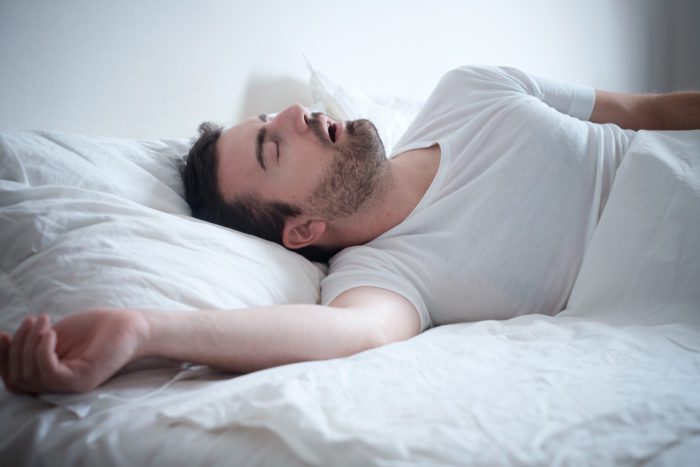Do you or your partner snore, or wake up feeling tired?
You may want to evaluate your risk of sleep apnea. Sleep apnea is categorized as a severe sleep disorder that occurs when a person’s breathing is disrupted during sleep. Patients with sleep apnea repeatedly stop breathing throughout their sleep cycle. Pauses in breath can lead to a lack of oxygen to the major organs in the body.
The most common type of sleep apnea is obstructive sleep apnea, which occurs when there is a blockage in the airway, usually caused by collapsed soft tissue in the back of the throat.
In addition to addressing common dental concerns, our dental office in Towson, Maryland, treats sleeping disorders.

Am I At Risk For Sleep Apnea?
Although anyone can develop sleep apnea, certain types of patients are at a higher risk of developing it. Our dental care team at Welinsky Dental Care can access your risk for sleep apnea and work with you to coordinate the care you need.
- Male
- Large neck circumference
- Being overweight
- A family history of sleep apnea
- High blood pressure
- Diabetic
Finding the most appropriate treatment is key to restoring a better quality of life. Our team may work in coordination with a sleep specialist to coordinate the testing and care you may need.
The Consequences of Sleep Apnea
While you may think that snoring is harmless, untreated sleep apnea can lead to severe consequences. What occurs when you have sleep apnea, is the soft tissue collapsing in the back of the throat. This causes you to actually stop breathing for brief periods of time throughout the night. Your body isn’t getting enough oxygen, leading to low blood oxygen levels and other issues.
Sleep is also crucial for many different life functions. It helps us retain memories, therefore memory loss is common in those with sleep apnea. Not getting enough sleep makes you generally foggy and you may struggle in work or school because of the inability to think clearly. You may get irritable and depressed, or fall asleep in inconvenient situations.
In particular, sleep apnea is linked to heart problems and diabetes. Obesity and sleep apnea often go hand in hand, and it’s likely for someone to have both conditions. Sleep apnea is linked to having an increased risk of high blood pressure, heart failure, stroke, and irregular heart rhythm. Patients are also more likely to have high levels of bad cholesterol.
If you have asthma or breathing problems, these are exacerbated by sleep apnea. Your immune system is lowered because you aren’t resting well, so you’re more vulnerable to infections. With all of these factors combined, people that have sleep apnea have a higher risk of death as well.
How Is Sleep Apnea Treated?
Tragically, sleep apnea is treated using a CPAP machine. However, some patients are intolerant to the CPAP machine or just seek alternative methods for treatment.
Oral sleep appliance therapy is an effective alternative to the CPAP machine. Your dentist will work in coordination with a specialist to determine if oral sleep appliance therapy is right for your needs. This form of treatment is similar to a sports mouthguard.
An oral sleep appliance is designed with your measurements and needs in mind to ensure a custom fit. Since it is designed using your exact measurements, an oral sleep appliance can help prevent the soft tissue in the back of the throat from collapsing, allowing you to breathe normally during sleep.
Treating sleep apnea is crucial to restoring your quality of life and reducing your risk of serious health concerns. To schedule a consultation with our team at Welisnsky Dental Care, call 410-449-7656 or request an appointment online.
